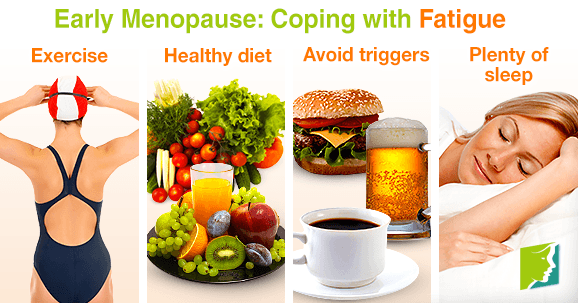Menopause occurs one year after a woman's last period. The menopause transition (i.e., the time leading up to menopause) is typically accompanied by many frustrating symptoms. Fatigue is one of the most frequently reported symptoms of menopause, as it affects as many as 80% of women daily. Fatigue is generally described as the feeling of decreased energy levels, exhaustion, and tiredness. Primarily it is caused by hormonal fluctuations due to a decrease in estrogen and progesterone levels. Fatigue can also be a result of lifestyle factors like insufficient sleep and exercise, stress, and poor diet.
Causes of Fatigue during Early Menopause
Hormone imbalance is the primary cause of nearly all menopausal symptoms, fatigue included. The decrease in estrogen and progesterone disrupts the natural functions of the body and causes bothersome symptoms. Estrogen and progesterone are essential hormones that allow the body to feel drowsy and maintain a sleep-wake cycles. Subsequently, when these hormone levels decrease, women often have more difficulty falling asleep.
Aside from hormonal imbalance, there are several lifestyle factors that can cause fatigue, including stress, overwork, poor diet, and insufficient exercise, or sleep. Additional characteristics of fatigue include loss of motivation, decreased attention, irritability, headaches, dizziness, achy muscles, loss of appetite, moodiness, blurred vision, and lethargy. Fortunately, there are several natural ways to cope with menopausal fatigue.
Coping with Fatigue
Here are a few tips to help you combat fatigue during early menopause:
Exercise
Exercise may seem like the last thing you want to do when feeling fatigued, but it has been proven to help combat fatigue and boost energy levels. The University of Georgia recently conducted a study which examined the effects of exercise on people suffering from constant fatigue. The results showed that exercising at moderate intensity three times a week can deliver a 20% increase in energy by the end of six weeks.
Low-intensity workouts like biking, walking, yoga, and swimming are simple, relaxing, and beneficial exercise methods that can also help reduce stress. Exercise has also been shown to help alleviate other menopausal symptoms like weight gain, sore breasts, and headaches.
A healthy diet
Maintaining a proper diet is another essential method for coping with fatigue. It is important to incorporate as many of the food groups into as many daily meals as possible. Eating small, healthy meals and snacks every three to four hours has been shown to prevent fatigue. Eating plenty of fruits and vegetables, as well as extra protein and vitamins, can also help boost energy levels.
Try to avoid excessive alcohol or caffeine consumption, fatty processed foods, and skipping meals. Finally, make sure you get plenty of sleep. This seems like an obvious piece of advice, but many people do not get a sufficient amount of sleep at night, and it severely affects their daily performance. The recommended amount of sleep is around eight hours per night.
Fatigue is a bothersome symptom of menopause that affects over two-thirds of women each day. Fatigue can interfere with the ability to carry out daily activities, relationships, and overall quality of life. The main cause of fatigue in menopausal women is hormone imbalance, and can range from mild to severe. A few natural ways to cope with fatigue include doing plenty of exercise, eating well, and getting plenty of sleep.
Sources
- Better Health Channel. (2011). Fatigue fighting Tips. Retrieved August 4, 2014 from http://www.betterhealth.vic.gov.au/bhcv2/bhcarticles.nsf/pages/Fatigue_fighting_tips
- National Health Service UK. (2013). Why am I tired all the time? Retrieved August 4, 2014 from http://www.nhs.uk/Livewell/tiredness-and-fatigue/Pages/why-am-I-tired.aspx
- National Institutes of Health. (2014). Fatigue. Retrieved August 4, 2014, from http://www.nlm.nih.gov/medlineplus/fatigue.html
- Puetz, T.W. , Flowers, S.S. & O'Connor, P.J. (2008). A randomized controlled trial of the effect of aerobic exercise training on feelings of energy and fatigue in sedentary young adults with persistent fatigue. Psychotherapy and psychosomatics, 77(3), 167-174. doi: 10.1159/000116610




